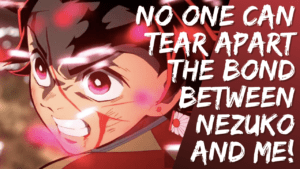Let’s learn Japanese with Shuichi Akai’s quote from Detective Conan (名探偵コナン, Meitantei Conan).
CONTENTS
Video
Shuichi Akai’s Quote
Japanese: 死の恐怖は死そのものより人を悩ます。
Romaji: shi no kyōfu wa shi sonomono yori hito o nayamasu.
English: Fear of death is worse than death itself.
Analysis
死 is a noun meaning “death”.
の is the particle used between nouns when the preceding noun modifies the following noun.
And the following noun is 恐怖 meaning “fear” so 死の恐怖 means “fear of death”.
The は particle indicates the preceding noun is the topic, i.e. what is being talked about, and the following is the comment, i.e. what is being said about the topic.
So 死の恐怖 meaning “fear of death” is the topic and 死そのものより人を悩ます is the comment about “fear of death”. Now let’s break down the comment part.
死そのもの means “death itself”. そのもの directly means “that (その) thing (もの)” used to emphasise the preceding noun when it’s a thing or idea. So 死そのもの expresses “only death and nothing else”.
より is the particle meaning “than”, so 死そのものより means “than death itself”
人 means “people”.
人 can be singular and plural .
あの人はすごく変わった。(singular) – That person has changed a lot.
人は簡単に変わらない。(plural) – People don’t change easily.
The を particle indicates the direct object of the following verb.
And the following verb is 悩ます which is a transitive verb meaning “to bother, worry or trouble someone”. It’s used when something makes someone think very hard as it’s difficult, complicated, confusing, tricky or troublesome. So 人を悩ます means “to bother people”.
So 死の恐怖は死そのものより人を悩ます means “fear of death bothers people more than death itself”, and he says 臆するなよ which means “Do not fear” or “Do not hesitate”. These words are for his workmate who is going to be sent on a difficult mission where he might die. So he is advising him to overcome fear of death because if he gets caught up in fear of death it might lead him to fail the mission.
Examples
Noun + そのもの (“itself”, emphasises the preceding noun)
商品そのものは素晴らしいが、梱包が雑だった。
shōhin sonomono wa subarashii ga, konpō ga zatsu datta.
The product itself is great, but it was poorly packaged.
お金のためではなく、仕事そのものが好きで働いている。
okane no tame dewa naku, shigoto sonomono ga suki de hataraite iru.
I work as I like my job itself, not for money.
日程変更も考えたが、結局、旅行そのものを中止にした。
nittei henkō mo kangaeta ga, kekkyoku, ryokō sonomono o chūshi ni shita.
We thought about changing the itinerary but after all, we cancelled the trip itself.
In this usage, the preceding noun should be a thing or idea (inanimate object) and そのもの can be replaced with 自体 (itself).
商品自体は素晴らしいが、梱包が雑だった。
shōhin jitai wa subarashii ga, konpō ga zatsu datta.
The product itself is great, but it was poorly packaged.
そのもの can also be used to emphasise な-adjectives, but in this usage, it CANNOT be replaced with 自体.
ルフィはよく食べてよく寝て、元気そのもの(
自体)だ。rufī wa yoku tabete yoku nete, genki sonomono da.
Luffy eats well and sleeps well, he is full of energy.
It can also express a metaphor. In this usage, the preceding noun can be a person or animal, but CANNOT be used with 自体.
彼女は天使そのもの(
自体)だ。kanojo wa tenshi sonomono da.
She is just like an angel.
目の前で泣いている女は、昔の私そのもの(
自体)だった。menomae de naiteiru onna wa, mukashi no watashi sonomono datta.
The woman crying in front of me was just like my old self.
より (than)
君は薔薇より美しい。
kimi wa bara yori utsukushii.
You are more beautiful than roses.
ジェシーはクラスのどの学生より速く走れる。
jesshī wa kurasu no dono gakusei yori hayaku hashireru.
Jessie can run faster than any other students in class.
中国語は日本語より難しいと思います。
chūgokugo wa nihongo yori muzukashii to omoimasu.
I think Chinese is more difficult than Japanese.
悩ます (to bother/worry/trouble someone)
税金の値上げはいつも国民を悩ます。
zeikin no neage wa itsumo kokumin o nayamasu.
Tax hike always bothers the citizens.
子供の難しい質問は親を悩ます。
kodomo no muzukashii shitsumon wa oya o nayamasu.
Parents find it hard answering kids’ tough questions.
最近いたずら電話に悩まされている。
saikin itazura denwa ni nayamasarete iru.
I have been bothered by nuisance calls lately.
頭を悩ます (lit. “to bother one’s head”) is the idiom meaning “to rack one’s brain” (to think very hard in order to try to solve a difficult problem).
職場の人間関係に頭を悩ましている。
shokuba no ningenkankei ni atama o nayamashite iru.
I’ve been racking my brain for relationships at work.
悩ます can be replaced with 悩ませる which is the causative form of an intransitive verb 悩む (to worry). Causative form is used when something causes someone to carry out the action, so 悩ませる emphasises that someone is FORCED to bother.
彼は私を悩ます – He worries me
彼は私を悩ませる – He makes me worry
They are mostly interchangeable, but you usually use 悩ます in the passive form.
OK: 騒音に悩まされる – I am bothered by the noise
???: 騒音に悩ませられる – I am made to be bothered by the noise
(It’s grammatically correct but it sounds redundant)
Support Easy Peasy Japanesey
If you enjoy our content, please consider supporting Easy Peasy Japanesey. Your support will help keep us going. Thanks for all your support!


